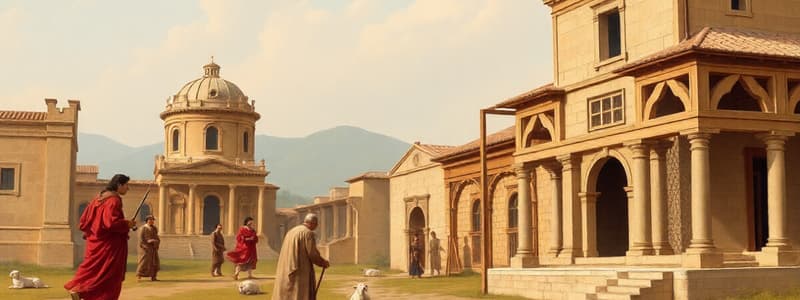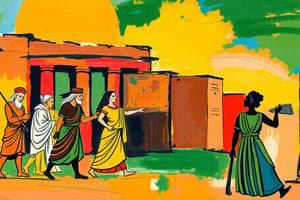Podcast
Questions and Answers
What is the primary focus of nationalism as a political ideology?
What is the primary focus of nationalism as a political ideology?
- Advocating for colonial expansion
- Promoting international cooperation
- Encouraging economic globalization
- Emphasizing a particular nation's interests (correct)
Which historical figure is known for leading the Indian independence movement and advocating for nonviolent resistance?
Which historical figure is known for leading the Indian independence movement and advocating for nonviolent resistance?
- Julius Caesar
- Nelson Mandela
- Mahatma Gandhi (correct)
- Genghis Khan
What does globalization primarily involve?
What does globalization primarily involve?
- The establishment of feudal systems
- The formation of isolated national identities
- Interaction and integration on an international scale (correct)
- The enforcement of imperialistic policies
What is one characteristic of feudalism?
What is one characteristic of feudalism?
Which empire is Genghis Khan credited with founding?
Which empire is Genghis Khan credited with founding?
What major development occurred during the Prehistoric Era?
What major development occurred during the Prehistoric Era?
What was a significant achievement of Ancient Civilizations?
What was a significant achievement of Ancient Civilizations?
Which period is known for the birth of Humanism?
Which period is known for the birth of Humanism?
What economic transition began during the Industrial Revolution?
What economic transition began during the Industrial Revolution?
What was a notable characteristic of the Middle Ages?
What was a notable characteristic of the Middle Ages?
Which event was prominent during the 20th century?
Which event was prominent during the 20th century?
What does the term 'civilization' refer to?
What does the term 'civilization' refer to?
What is a key theme in history regarding the impacts of warfare?
What is a key theme in history regarding the impacts of warfare?
Flashcards are hidden until you start studying
Study Notes
Key Periods in History
-
Prehistoric Era
- Time before written records.
- Development of early human societies.
- Major events: discovery of fire, invention of tools.
-
Ancient Civilizations
- Rise of cities and empires (e.g., Mesopotamia, Egypt, Indus Valley, China).
- Development of writing systems (cuneiform, hieroglyphics).
- Significant achievements in governance, trade, and culture.
-
Classical Antiquity
- Development of major religions (e.g., Hinduism, Buddhism, Judaism, and Christianity).
- Greek and Roman empires: philosophy, art, and engineering.
- Conquests and cultural exchanges (e.g., Alexander the Great).
-
Middle Ages
- Feudalism and the manor system in Europe.
- The Spread of Islam and the Byzantine Empire.
- The Crusades and their impact on culture and trade.
-
Renaissance
- Rebirth of art and learning in Europe (14th to 17th centuries).
- Key figures: Leonardo da Vinci, Michelangelo, Galileo.
- Humanism and exploration (Columbus, Magellan).
-
Early Modern Period
- The Reformation and religious conflicts.
- Scientific Revolution and Enlightenment ideas.
- Expansion of European empires and transatlantic trade.
-
Industrial Revolution
- Shift from agrarian economies to industrialized ones (18th to 19th century).
- Innovations in technology (steam engine, spinning jenny).
- Urbanization and social changes, including labor movements.
-
20th Century
- Major conflicts: World Wars I and II, the Cold War.
- Decolonization and the rise of national independence movements.
- Technological advancements and the information age.
-
Modern Era
- Globalization and its effects on cultures and economies.
- Environmental challenges and political movements.
- Ongoing issues: inequalities, wars, and human rights.
Key Themes in History
- Power and Authority: Examination of governments, leadership, and political systems.
- Cultural Development: Role of religion, art, philosophy, and science in shaping societies.
- Economic Systems: Transition from feudalism to capitalism and the effects of industrialization.
- Social Structures: Class systems, gender roles, and demographic changes through history.
- Conflict and Resolution: Causes and consequences of wars, revolutions, and peace treaties.
Important Historical Terms
- Civilization: A complex society characterized by urban development, social stratification, and cultural achievements.
- Imperialism: A policy of extending a country's power and influence through colonization or military force.
- Feudalism: A hierarchical system of land ownership and duties prevalent in medieval Europe.
- Nationalism: A political ideology emphasizing the interests of a particular nation, often at the expense of international considerations.
- Globalization: The process of interaction and integration among people, companies, and governments on an international scale.
Notable Historical Figures
- Alexander the Great: Conquered much of the known world; spread of Hellenistic culture.
- Julius Caesar: Key figure in the transition from Roman Republic to Empire.
- Genghis Khan: Founder of the Mongol Empire; known for military prowess and consolidating territories.
- Mahatma Gandhi: Leader of the Indian independence movement; proponent of nonviolent resistance.
- Nelson Mandela: Anti-apartheid revolutionary; first black president of South Africa.
Study Tips
- Create a timeline to visualize major events and periods.
- Compare and contrast different civilizations and their contributions.
- Use flashcards for important terms and figures.
- Engage in discussions or debates about key themes and historical interpretations.
Prehistoric Era
- Period before written records
- Development of early human societies
- Key events: discovery of fire, invention of tools
Ancient Civilizations
- Rise of cities and empires (e.g., Mesopotamia, Egypt, Indus Valley, China)
- Development of writing systems (cuneiform, hieroglyphics)
- Significant achievements in governance, trade, and culture
Classical Antiquity
- Development of major religions (e.g., Hinduism, Buddhism, Judaism, and Christianity)
- Greek and Roman empires: philosophy, art, and engineering
- Conquests and cultural exchanges (e.g., Alexander the Great)
Middle Ages
- Feudalism and the manor system in Europe
- The Spread of Islam and the Byzantine Empire
- The Crusades and their impact on culture and trade
Renaissance
- Rebirth of art and learning in Europe (14th to 17th centuries)
- Key figures: Leonardo da Vinci, Michelangelo, Galileo
- Humanism and exploration (Columbus, Magellan)
Early Modern Period
- The Reformation and religious conflicts
- Scientific Revolution and Enlightenment ideas
- Expansion of European empires and transatlantic trade
Industrial Revolution
- Shift from agrarian economies to industrialized ones (18th to 19th century)
- Innovations in technology (steam engine, spinning jenny)
- Urbanization and social changes, including labor movements
20th Century
- Major conflicts: World Wars I and II, the Cold War
- Decolonization and the rise of national independence movements
- Technological advancements and the information age
Modern Era
- Globalization and its effects on cultures and economies
- Environmental challenges and political movements
- Ongoing issues: inequalities, wars, and human rights
Power and Authority
- Examination of governments, leadership, and political systems
Cultural Development
- Role of religion, art, philosophy, and science in shaping societies
Economic Systems
- Transition from feudalism to capitalism and the effects of industrialization
Social Structures
- Class systems, gender roles, and demographic changes through history
Conflict and Resolution
- Causes and consequences of wars, revolutions, and peace treaties
Civilization
- A complex society characterized by urban development, social stratification, and cultural achievements
Imperialism
- A policy of extending a country's power and influence through colonization or military force
Feudalism
- A hierarchical system of land ownership and duties prevalent in medieval Europe
Nationalism
- A political ideology emphasizing the interests of a particular nation, often at the expense of international considerations
Globalization
- The process of interaction and integration among people, companies, and governments on an international scale
Alexander the Great
- Conquered much of the known world; spread of Hellenistic culture
Julius Caesar
- Key figure in the transition from Roman Republic to Empire
Genghis Khan
- Founder of the Mongol Empire; known for military prowess and consolidating territories
Mahatma Gandhi
- Leader of the Indian independence movement; proponent of nonviolent resistance
Nelson Mandela
- Anti-apartheid revolutionary; first black president of South Africa
Studying That Suits You
Use AI to generate personalized quizzes and flashcards to suit your learning preferences.




